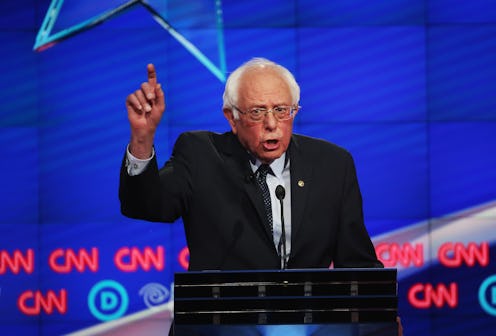News
Here's Where Bernie's Got Problems
Thursday night's Democratic primary debate is in the books, and it was a lively and at times hostile affair. It makes sense that thinks have heated up a bit in the campaign, with Clinton recently accusing Sanders of being underprepared for the rigors of the presidency, and Sanders accusing Clinton of being "not qualified" for the top job due to her fundraising from major Wall Street firms, both of which got airtime during CNN's debate. But there was one moment that spoke somewhat to Clinton's criticism ― a Bernie Sanders quote that reveals maybe his biggest problem.
It happened when moderator Errol Louis questioned Sanders on his past statements about prison reform, specifically his promise to considerably cut the number of people incarcerated in America. The line, which he's used multiple times over the last several months (including on his official Twitter account), goes something like this: "At the end of my first term, we will not have more people in jail than any other country."
That's how he put it during a rally in February. And on Thursday night, Louis held him to account for this pledge, asking him how he could promise to undo America's highest-in-the-world prison population ― the United States currently has about 2.2 million people incarcerated, compared to about 1.7 million for China ― when all but about 200,000 of them are in state prisons, not federal ones.
Here's how Louis put the question to the junior senator form Vermont:
Senator Sanders, I have a question for you related to this. You've said that by the end of your first term as president, the U.S. will no longer lead the world in mass incarceration. To fulfill that promise you'd have to release roughly half a million prisoners. How are you going to do that, since the vast majority of American prisoners are not under federal jurisdiction?
Here's how Sanders responded ― he claimed, in essence, that the seeming impossibility of releasing that many prisoners would be overcome by working with state governments, and building consensus with Republicans. Actually, Sanders seems to think this actionable bipartisan consensus on lowering incarceration rates already exists:
We're going to work with state governments all over this country, and you know what? In a very divided Congress, and a very divided politics in America, actually the one area where there is some common ground is conservatives understand that it's insane to be spending $80 billion a year locking up 2.2 million people. With federal and presidential leadership, we will work with state governments to make sure that people are released from jail, under strong supervision, that they get the kind of job training and education they need so they can return to their communities. On this one, Errol, I think you're going to see progressive and conservative support. We can do it if we're prepared to be bold.
This kind of neatly encapsulates the criticisms Sanders has been absorbing lately ― both that he isn't comfortable getting too deep into the details of his proposals, and that he might occasionally be over-promising for effect, without regard to the practical implications of what he's saying. It's true that there have been some cautiously promising signs on this front lately, but whatever shared agreement he thinks he sees on this issue, the idea that enough elected Republicans at the state or federal level are going to partner with a self-avowed Democratic socialist president to reduce the prison population by nearly 500,000?
Considering the last seven years of Republican obstructionism against President Obama's agenda ― an agenda, it must be said, that has been far more moderate than what Sanders is proposing ― this kind of argument seems naive in the extreme, and it raises real concerns. It creates the impression that Sanders is either saying something for effect that he knows he can't deliver, saying something in earnest that he doesn't realize is almost certainly impossible, or that he made a dramatic promise without thinking it through, and now doesn't have a better answer to offer up.
Obviously, it was just one moment in a wide-ranging debate, and it's possible that it won't loom large on the minds of most New York voters. But for anyone who prioritizes concrete, savvy, and perhaps even adversarial political strategy above broad-strokes promises, this moment might give some pause.
